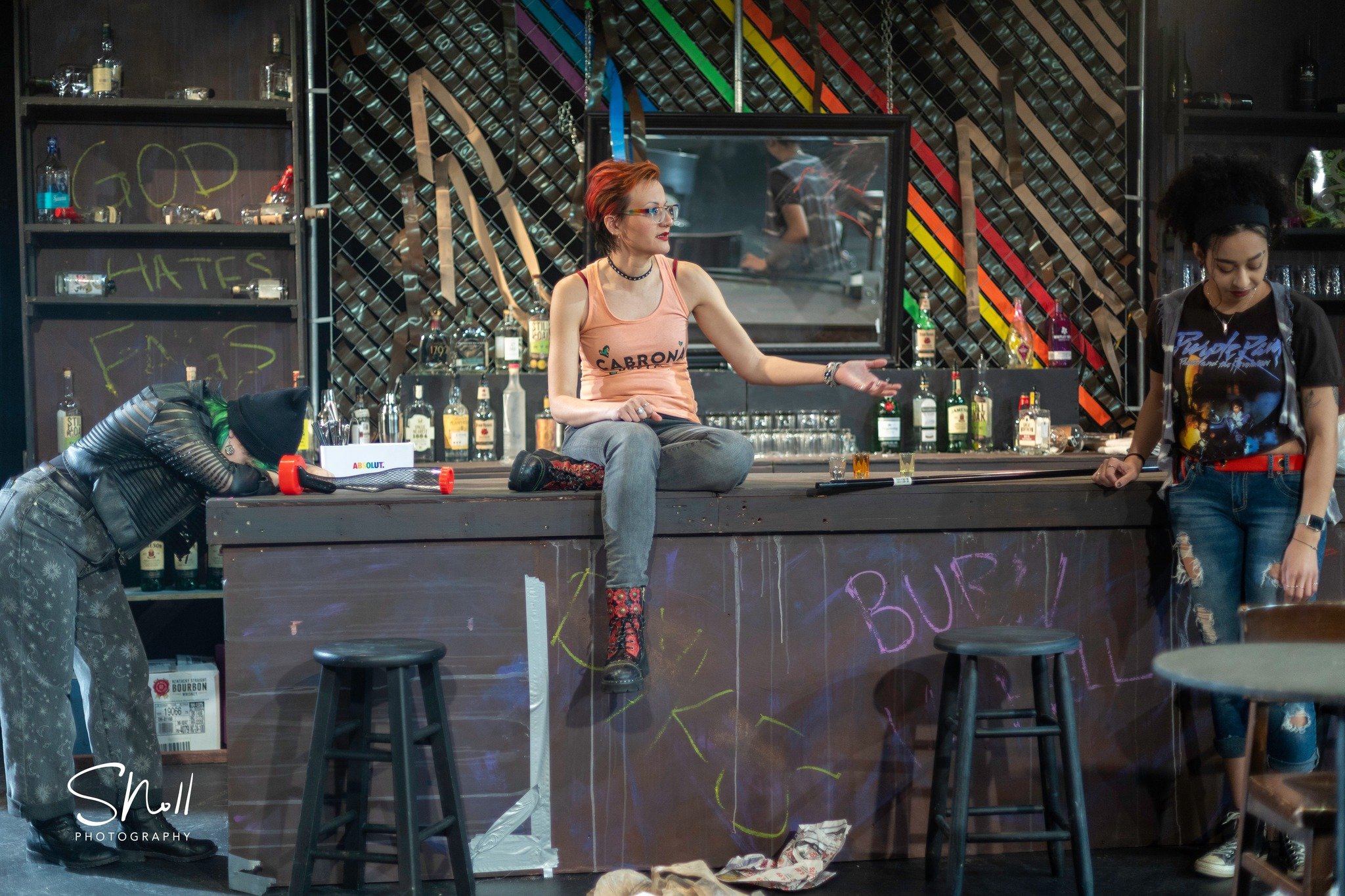Community Triumphs Over Hate in StageQ's "Laced"
Photo by Steve Noll.
Moments before Sam Mueller’s play Laced begins, the audience knows that something terrible has happened. This piece about identity, community, safety, and healing for LGBTQ+ individuals takes place in the unsettling period just after the Pulse Nightclub shooting in June 2016, and just before the presidential election in November of that year. In Stage Q’s smart staging of the play, when spectators enter the Evjue Stage space at the Bartell Theatre and find their way to their seats, they walk across the set — a gay bar in Florida called Maggie’s Place. As they do, audiences are plunged into a crime scene. Chairs at the bar are overturned. Trash is strewn everywhere. And hate speech graffiti has been scrawled in red and black across tables and on woodwork. As a result, the audiences are immediately disoriented, similar to the three characters in Laced, as they enter and silently survey the damage to their workplace.
The initial shock of the homophobic vandalism is one of the most powerful moments of the show, ably directed by Chris Diorio. As the play unfolds, three young, queer bartenders try to piece together what happened the night before, who could have committed this crime, and why they were targeted. Echoes of previous anti-gay violence haunt them. The specter of an increasingly intolerant White House (and emboldened hate groups) looms ahead. And the space where they felt seen and accepted is suddenly defiled and no longer safe.
Scenes bounce back and forth between the present and the night before — when all three were busy pouring drinks, enjoying music on the dance floor, and talking through some personal issues relating to their sexuality. In between their work banter, each member of the staff also has an introspective monologue, giving their character a more complete backstory.
Photo by Alec Noel.
Minnow (Phrannie Lyons) is sort of in charge. Her boss and her ex, Maggie, left abruptly for a Caribbean cruise and hasn’t spoken to anyone since, so she is filling in behind the bar and managing the staff while casually bending a lot of Maggie’s rules.
Cat (Alyssa Stowe) is the withdrawn and moody one in the group. They can spot a fake ID a mile away but only really feel at home when they are performing drag.
Audra (Kendra James) wears her love for the musician formerly known as Prince literally on her sleeve. She is bi, and having relationship issues with a cishet guy, but not finding the support she needs inside or outside the gay community. In the small cast, James stands out as the most accomplished performer. As Audra, both casual conversations and growing frustrations flow from James organically, creating a truly three-dimensional character.
Although Mueller’s script occasionally feels talky and veers toward a too-tidy ending, it also contains some interesting poetic beats that the cast handles well. Their simultaneous conversations and mixology mantra is captivating.
Photo by Steve Noll.
Teresa Sarkela’s set is truly impressive, taking over the small space. The large, intricately detailed bar dominates the scene and delineates a clear line between private and public conversations while customers are present. Windows filled with neon signs and walls of the theater decorated with bar paraphernalia draw the audience into the space and make the setting feel immersive.
Similarly, Zak Stowe’s lighting design and Spencer Christoffel’s sound design make the transitions between memory and reality very clear. In flashbacks, the combination of colorful, pulsing light and dance music transforms the space into a crowded, festive disco party in the wee hours of the morning. When those lights and sounds drain away, the harshness of day sets in and it’s impossible not to see the destruction and derision the vandals have left behind.
Initially scheduled for the 2020 season, this production of Laced still feels tragically relevant. As legislatures across the country pass bills designed to exclude and suppress the LGBTQ+ community, this play is an important reminder of all the instances in the past when the community has come under attack — and has persevered.


